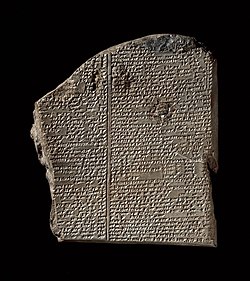Epic of Gilgamesh
The Epic of Gilgamesh is an epic poem from ancient Mesopotamia. It is one of the earliest works of literary fiction known.
The most complete version that exists today was preserved on twelve clay tablets in the library collection of the 7th century BC Assyrian king Ashurbanipal. A series of Sumerian legends and poems about the mythological hero-king Gilgamesh were probably gathered into a longer Akkadian poem some time before the 7th century BC.
The essential story is about the relationship between Gilgamesh, a king who has become distracted and disheartened by his rule, and a friend, Enkidu, who is half-wild and who undertakes dangerous quests with Gilgamesh. Much of the epic focuses on Gilgamesh's thoughts of loss following Enkidu's death. It is often credited as being one of the first literary works with emphasis on immortality.
The epic is widely read in translation, and the hero, Gilgamesh, has become an icon of popular culture.
History
Gilgamesh was the fifth king of Uruk, an ancient city of Sumer. His supposed historical reign is believed to lie within the period 2700 to 2500 BC, 200–400 years before the earliest known written stories. His father was the third king, Lugalbanda.
The Epic of Gilgamesh was about him.
Epic Of Gilgamesh Media
Ancient Assyrian statue currently in the Louvre, possibly representing Gilgamesh
- Enkidu, Gilgamesh's friend. From Ur, Iraq, 2027-1763 BCE. Iraq Museum.jpg
Enkidu, Gilgamesh's friend. From Ur, Iraq, 2027–1763 BC, Iraq Museum
The Gilgamesh Dream tablet. From Iraq. Middle Babylonian Period, First Sealand Dynasty, 1732–1460 BCE. Iraq Museum, Baghdad. This dream tablet recounts a part of the epic of Gilgamesh in which the hero (Gilgamesh) describes his dreams to his mother (the goddess Ninsun), who interprets them as announcing the arrival of a new friend, who will become his companion.
Fragment of Tablet II of the Epic of Gilgamesh, Sulaymaniyah Museum, Iraq
The second dream of Gilgamesh on the journey to the Forest of Cedar. Epic of Gilgamesh tablet from Hattusa, Turkey. 13th century BCE. Neues Museum, Germany.
Reverse side of the newly discovered tablet V of the Epic of Gilgamesh. It dates back to the old Babylonian period, 2003–1595 BC, and is currently housed in the Sulaymaniyah Museum, Iraq
Bibliography
Editions
- George, Andrew R. (2003). The Babylonian Gilgamesh Epic: Critical Edition and Cuneiform Texts. England: Oxford University Press. ISBN 0-19-814922-0.
- George, Andrew R (1999). The Epic of Gilgamesh. Penguin Books. ISBN 0-14-044919-1.
- Foster, Benjamin R (2001). The Epic of Gilgamesh. New York: W.W. Norton & Company. ISBN 0-393-97516-9.
- Kovacs, Maureen Gallery (1985). The Epic of Gilgamesh. Stanford University Press: Stanford, California. ISBN 0-8047-1711-7. Glossary, Appendices, Appendix (Chapter XII=Tablet XII). A line-by-line translation (Chapters I-XI).
- Jackson, Danny (1997). The Epic of Gilgamesh. Wauconda, IL: Bolchazy-Carducci Publishers. ISBN 0-86516-352-9.
- Mason, Herbert (1970). Gilgamesh: A Verse Narrative. Boston: Mariner Books. ISBN 978-0-618-27564-9.
- Mitchell, Stephen (2004). Gilgamesh: A New English Version. New York: Free Press. ISBN 0-7432-6164-X.
- Sandars, N. K. (2006). The Epic of Gilgamesh (Penguin Epics). ISBN 0-14-102628-6 - re-print of the Penguin Classic translation (in prose) by N. K. Sandars 1960 (ISBN 0-14-044100-X) without the introduction.
- Parpola, Simo; Mikko Luuko; Kalle Fabritius (1997). The Standard Babylonian, Epic of Gilgamesh. The Neo-Assyrian Text Corpus Project. ISBN 951-45-7760-4. (Volume 1) in the original Akkadian cuneiform and transliteration; commentary and glossary are in English
- Ferry, David (1993). Gilgamesh: A New Rendering in English Verse. New York: Farrar, Straus and Giroux. ISBN 0374523835.
Other
- Damrosch, David (2007) The Buried Book: The Loss and Rediscovery of the Great Epic of Gilgamesh. Henry Holt and Co, ISBN 0-8050-8029-5
- Jacobsen, Thorkild (1976) The Treasures of Darkness, A History of Mesopotamian Religion, New Haven: Yale University Press, ISBN 0-300-01844-4
- West, Martin (1997) The East Face of Helicon: West Asiatic Elements in Greek Poetry and Myth, New York: Clarendon Press, ISBN 0-19-815042-3
Other websites
- Translations for several legends of Gilgamesh in the Sumerian language can be found in Black, J.A., Cunningham, G., Fluckiger-Hawker, E, Robson, E., and Zólyomi, G., The Electronic Text Corpus of Sumerian Literature (http://www-etcsl.orient.ox.ac.uk/ Archived 2008-12-10 at the Wayback Machine), Oxford 1998-.
- Babylonian (Akkadian) texts: ETCSL
- Gilgamesh and Huwawa Archived 2006-12-30 at the Wayback Machine, version A - (the adventure of the cedar forest)
- Gilgamesh and Huwawa Archived 2007-06-29 at the Wayback Machine, version B
- Gilgamesh and the Bull of Heaven Archived 2002-08-07 at the Wayback Machine
- Gilgamesh and Aga Archived 2008-05-05 at the Wayback Machine
- Gilgamesh, Enkidu and the nether world Archived 2002-08-25 at the Wayback Machine
- The death of Gilgamesh Archived 2006-12-30 at the Wayback Machine
- The Project Gutenberg eBook, An Old Babylonian Version of the Gilgamesh Epic, by Anonymous, Edited by Morris Jastrow, Translated by Albert T. Clay
- Epic of Gilgamesh, summary by M. McGoodwin
- Gilgamesh Archived 2005-12-30 at the Wayback Machine by Richard Hooker (wsu.edu)
- The Epic of Gilgamesh: A Spiritual Biography (theosophy-nw.org)
- Tablets
- Flood
- Comparison of equivalent lines in six ancient versions of the flood story Archived 2006-08-29 at the Wayback Machine (noahs-ark-flood.com)
- Comparison of The Epic of Gilgamesh to the Genesis flood Archived 2019-07-25 at the Wayback Machine (religioustolerance.org)
- Comparison of the Flood in Genesis to the Epic of Gilgamesh and related literature (Christian-thinktank.com)
| Wikimedia Commons has media related to Lua error in Module:Commons_link at line 62: attempt to index field 'wikibase' (a nil value).. |






